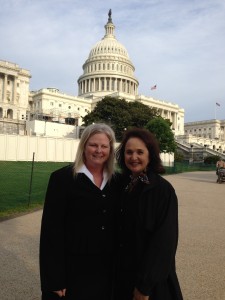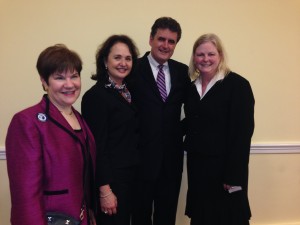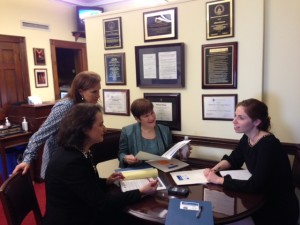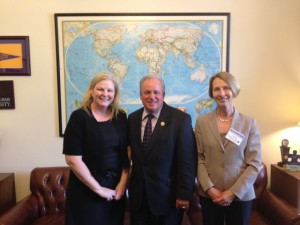
My Experience Lobbying for Cancer Research on Capitol Hill
-
Every once in a while, it’s important to get on a train and go to Washington to make your voice heard. At Fox Chase Cancer Center’s kind invitation, I went with Communications Director Lisa Bailey and fellow breast cancer survivor Kim Hagerich to the Capitol on May 8.
We joined oncologists, researchers, cancer center administrators, and other survivors from across the country for a Hill Day organized by the Association of American Cancer Institutes (AACI), the American Association for Cancer Research (AACR), the American Society of Clinical Oncology (ASCO), and the Friends of Cancer Research.
On May 8, all of these busy folks took time to converge on Washington to tell their representatives in Congress why it’s vital to maintain a strong commitment to funding for the National Institutes of Health (NIH); and in fiscal year 2015, allocate at least $32 billion including $5.26 billion for the National Cancer Institute (NCI). The group arrived at this figure as being the minimum necessary to ensure that the momentum in scientific discovery achieved over the past few years will continue to yield important advances in patient care, and mitigate the harmful impact of budget cuts in 2013 caused by sequestration. The reduced funding under the budget sequester in FY 2013 caused the NIH to issue the lowest number of competing research project grants since FY1998.
What do the budget cuts mean for patients and cancer centers?
What this has meant for cancer centers across the United States, including Fox Chase, is reductions in the number of labs and more competition for fewer grants. For patients, reduced national funding for cancer research means that discovery is stalled and pressing questions go unanswered.

Our Pennsylvania delegation met with Rep. Michael Fitzpatrick (R-PA8), Rep. Mike Doyle (D-PA 14), and legislative aides for Sen. Robert Casey (D-PA), Sen. Pat Toomey (R-PA), Rep. Allyson Schwartz (D-PA13), and Rep. Chaka Fattah (D-PA2). We told them first-hand the importance of consistent, reliable and substantial research funding for the health of the public but also the economic growth of the Pennsylvania economy and the ability of America to maintain global leadership in science and technology.
Without a strong commitment to funding, researchers will follow opportunities abroad and fewer talented students will opt for careers in research. Doug Hartman, legislative correspondent for Senator Casey, informed us of The American Cures Act, introduced by Senate Majority Whip Dick Durbin (D-Illinois), and co-sponsored by Sen. Casey, that would establish a mandatory trust fund for biomedical research with an annual increase indexed to inflation. This measure attempts to reverse a downward trend in funding over the past 10 years and ensure a steady investment to allow the NIH, Centers for Disease Control and other federal agencies to plan longer term and to maximize efficiencies.
My Story

As a survivor who has benefited greatly from research into cancer genetics, I shared my story with our representatives. After my mother and aunt had both been diagnosed with breast cancer, I underwent genetic testing and learned that we all shared the BRCA2 mutation. As a result, doctors recommended increased surveillance including an MRI which caught my cancer at an early stage. As a result of research, I benefited from state-of the art surgical techniques, a chemotherapy regimen that allowed me to work part-time, radiation delivered with pinpoint accuracy, and a hormone therapy that will help prevent recurrence. Five years out, I have a positive outlook, but concerns about my children remain. Our daughter, 22, will have genetic testing at age 25. If she also has a BRCA mutation, what actions will be necessary? Oncologists recommend that our son, 19, also be tested (at age 30) because a gene mutation might increase his risk for prostate and other cancers.
What do we as patients do with this information? From a public policy standpoint, research is needed to provide better guidance so we can reduce the costly and stressful screening of the masses and focus on testing that will yield actionable results. Personalized medicine is well underway on many fronts, and we mustn’t slow the momentum. At Fox Chase, patients are benefiting from participation in more than 200 clinical trials open at any one time, accessing life-saving therapies years before they hit the formularies. Reduced federal funds for the NIH cuts directly into the clinical trials that are some patients’ best hope.
How has scientific research made an impact on your life?

I encourage you to share your story with your representatives and urge them to make cancer research funding a priority. Such investment spurs private investment and collaboration that is vital to the innovation we prize. We have a world-class comprehensive cancer center in our backyard. We need to keep it that way. To make your voice heard, share your opinion with your local representatives. Here is a link to fact sheet for each state, which will help you with talking points (there are also talking points at the bottom of this blog). To obtain contact information for the House of Representatives or to identify your local representative, click here or senator, click here.
